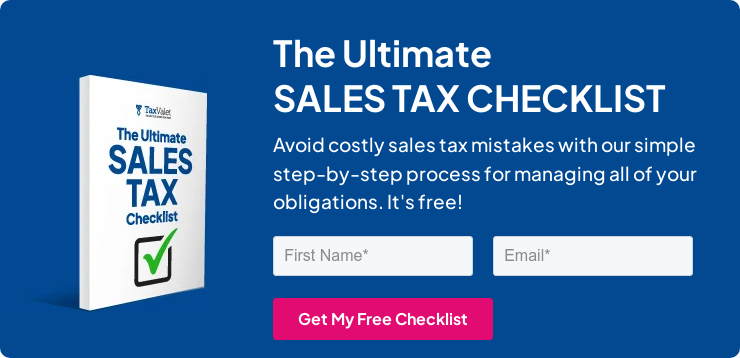Quick Answer: In this Sales Tax Basics Guide for U.S. Businesses, you’ll learn the basics of sales tax and if it is something your business needs to be addressing. You’ll also get the steps you can take now to get compliant with U.S. sales tax laws.
If you’re reading this article, you might already know that your business is supposed to collect and remit sales tax but aren’t totally sure how to get started. In this blog post, we are going to break down the basics of U.S. sales tax so you can protect your business from costly penalties and audits as it grows
Need help working out the sales tax for your company? Book a free consultation to see how TaxValet can step in as your fractional sales tax team.
But First, What is Sales Tax?
Sales tax basics. It might sound basic, but sales tax is due whenever the sale of a taxable product or service (like software) occurs. A sale occurs whenever something of value is exchanged for something else (typically money, but bartering could also constitute a sale) and the ownership or title is transferred from one party to another.
Unlike other parts of the world, such as the UK, sales tax in the United States is not typically included in the sales of the product. This means that sales tax is generally added to the sale price and customers typically pay for sales tax directly. That’s why you might hear sales tax referred to as a “direct tax”.
Sales tax collected from merchants is paid directly to the state governments and is not handled by the IRS. Each state has its own sales tax permit, its own sales tax return, and own processes. If you are filing sales tax returns yourself in more than a few states, the workload can be overwhelming!
What Sort of Products or Services Are Taxable?
Sales tax laws are definitely not basic as they vary state-to-state. However, most products you can touch and feel are taxable unless a specific exemption applies.
If you sell any of the following, you should pay special attention to state laws to see if an exemption applies. An exemption could save your customers a lot of money.
On the other hand, if you think the product you are selling is not taxable and in the end, it is, it could cost you a fortune. Businesses that sell computer software are particularly prone to making the mistake of not charging sales tax on their transactions.
Products with special taxation considerations include, but are not limited to:
- Admission sales
- Medical devices
- Oil and gas-related items
- Clothing
- Computers
- Construction materials
- Digital Products
- Food and beverages
- Hotel bookings and related charges
- Leases and rentals
- Manufacturing
- Marijuana
- Medicine and prescription drugs
- Nonprofit transactions
- Packaging
- Professional services (particularly accountants, CPAs, lawyers, pest control, security, veterinarian and parking services)
- Repair services
- Software (including Software-as-a-Service, custom software, and downloadable software)
- Telecommunications
This list is not exhaustive, but is meant to be a starting point for your research. If you need help determining how your products are taxed by a particular state, please contact us to get help.
How is Sales Tax Calculated?
The complexity of sales tax can be mind-boggling. There are over 12,000 sales tax jurisdictions in the United States and each of them varies in which products they tax. Some sales tax systems have over 10,000 different products they keep track of with respect to how they are supposed to be taxed.
Sales tax calculations are complex and we don’t want to overwhelm you, so here’s what you need to know.
The sales tax that is due is based on the tax rate for the locality and how the products are taxed by that locality.
For example, the author of this article lives in Durango, Colorado. When I make a purchase at my local outlet, I am currently paying a total of 8.4% in sales tax on items that are taxable. This is the sum of the state (2.9%), county (2%), special district (0%), and city (3.5%) sales tax.
Things can get a bit more complicated if the product I am buying is taxed by one jurisdiction but not another. For example, groceries are generally not subject to sales tax to Colorado, however La Plata County and the City of Durango have decided that they do want to tax food for home consumption. So I might pay a lower rate for groceries since I am not paying the state sales tax rate, but I am still subject to the city and county sales tax rate. Confused yet?
What Happens If You Don’t Pay Sales Tax?
If you do not pay sales tax in a state where you owe it, you may be forced to pay for any sales tax you didn’t collect from customers plus penalties and interest. Depending on the state, this could be a huge sum of money or it could be relatively minor. A lot of it comes down to the size of your business and the individual state penalties.
When we help our clients determine where to get sales tax permits, we will typically look at what our client’s overall exposure in a state is in the (unfortunate) event of an audit.
Typically, penalties are broken down into civil penalties and criminal penalties.
Civil Penalties are further broken down into failure to file, failure to pay, and intent to evade penalties. Most states charge a percentage of the tax due for failure to file and pay penalties. The percentages vary per state, but many will charge around 4% of the tax due, up until a maximum penalty (typically 30%) is reached. If you are behind on sales tax, a good rule of thumb is to look at your original sales tax due and add 30% to account for penalties and interest. By the way, if you’re behind on sales tax, we can help you get out of a portion of your penalties and interest through a voluntary disclosure program. Contact us to learn more about how we can help.
Criminal Penalties are further broken down into failure to file, failure to pay, and intent to evade penalties. Generally, if you are earnestly trying to stay compliant with sales tax laws you will not have to worry about criminal penalties. Criminal penalties are generally felonies or high and aggravated misdemeanors that have huge penalties ($10,000) with the possibility of jail time. Is not paying sales tax in itself considered a criminal penalty? It certainly can be, though you would likely need to go to great lengths to be uncooperative and intend to evade auditors.

How to Determine Where Your Business Owes Sales Tax
Your business owes sales tax where it has “nexus”. Nexus is just a legal term that means you have sufficient presence in a state to require you to collect and remit sales tax. There are various ways that your business can have sales tax nexus in a state. The two most common ways are through physical presence and economic nexus.
Physical presence. Generally, your business needs a sales tax permit anywhere it has a physical presence. The states vary in how they define physical presence, but generally, physical presence is created by:
- People: Employees and contractors will generally create sales tax nexus in the state where they perform work for you. Some states specify that short-term visits (like trade shows) do not constitute sales tax nexus.
- Property: Generally, having a place of business in the state (whether owned, rented, or leased) will create sales tax nexus.
- Inventory: Generally, storing inventory in a state (whether in a warehouse you own or with a third party fulfillment center) will create sales tax nexus.
- Affiliated Businesses: Generally, if you have another business with similar ownership, selling similar products, or have similar name/branding, then the nexus from one business can be transferred to the other business.
If you are unclear about where your business has sales tax nexus you can hire our team to help you with our Sales Tax Starter Kit.
Economic Nexus. Previously, states needed to prove your business had sufficient physical contact with their state before they could force you to collect and remit sales tax. All of that changed in 2018 when the Supreme Court overruled their previous position in the South Dakota v Wayfair ruling.
With this ruling, the Supreme Court made it legal to force businesses to collect and remit sales tax even if the business doesn’t have a physical presence in the state. Each state varies in what their economic nexus thresholds are, but the most common threshold is $100,000 in sales or 200 transactions within a year. For many businesses, it is a lot easier to cross the transaction count threshold than to cross that $100,000/year mark.
If you need help determining which states your business has crossed economic nexus thresholds, you can hire us to help by purchasing a Sales Tax Starter Kit.
What to Do Once You’ve Determined You Owe Sales Tax in a State
Step 1. Determine how your products are taxed.
Once you’ve determined your business owes sales tax in a state, you should next determine how your products are taxed by the state. If none of your products are taxable by the state, you might not need to get a permit after all (hooray). If you sell services, software, digital products, drugs, or clothing, pay special attention to how the state laws are written. If you need help determining if the products you sell are taxed by a particular state, please consider contacting us.
Step 2. Get a sales tax permit.
If you have sales tax nexus in a state and your products are taxable by the state, then you should consider getting a sales tax permit. Turnaround times vary, but it will generally take a month for a state to issue your sales tax permit. Once you have your permit, you can begin collecting sales tax from customers.
There are typically multiple permit types available in each state and figuring out which permit type you need can be a bit confusing. We can help you get sales tax permits with our Sales Tax Permit Registration Service.
Step 3. Begin collecting sales tax.
Once you have a permit, you are ready to begin collecting sales tax from your customers. This typically involves fine-tuning your checkout platform or accounting system so that the correct amount of tax is calculated. We help our clients enable tax settings in their systems as part of our Done-for-You Sales Tax Service.
Step 4. File and pay the sales tax.
Now that you have a sales tax permit, you will need to submit sales tax returns when they are due. When you are issued a permit, you will typically be assigned a filing frequency of monthly, quarterly or annually. Each state has different forms and processes you must follow to file and pay sales tax returns. We handle the filing and payment of sales tax returns as part of our Done-for-You Sales Tax Service.
Who to Contact if You Need Help
If at any point while reading this article you were a little overwhelmed by the number of moving parts there are in sales tax, you are not alone. While we provided the basics of sales tax, we completely understand that sales tax is, in fact, not basic enough. In fact, this is part of the reason we have dedicated our entire careers to helping companies like yours eliminate the hassle and stress of sales tax.
If instead you would like a team of professionals to take care of everything for you, check out our services and don’t hesitate to reach out!
Our primary services include:
Sales Tax Starter Kit: For help with sales tax basics. We help determine where you owe sales tax as well as advise regarding next steps.
Done-for-You Sales Tax Service: Let our team of experts handle your sales tax each month.
Sales Tax Permit Registration Service: Let our team get sales tax permits for you.
Receive Important Sales Tax Updates to Your Inbox!
Join our mailing list to receive free updates that could help protect your business from audit.
Get in Touch
Company
Disclaimer: Nothing on this page should be considered tax or legal advice. Information provided on this page is general in nature and is provided without warranty.
Copyright TaxValet 2023 | Privacy Policy | Site Map

Disclaimer: Our attorney wanted you to know that no financial, tax, legal advice or opinion is given through this post. All information provided is general in nature and may not apply to your specific situation and is intended for informational and educational purposes only. Information is provided “as is” and without warranty.
What you should do now
- Get a Free Sales Tax Plan and see how Tax Valet can help solve your sales tax challenges.
- Read more articles in our blog.
- If you know someone who’d enjoy this article, share it with them via Facebook, Twitter, LinkedIn, or email.




